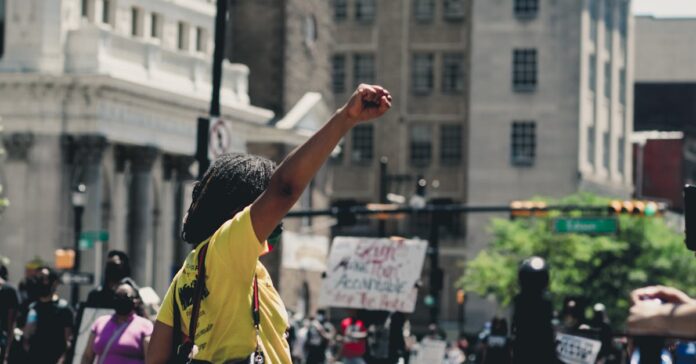The streets are alive with the chants. Black Lives Matter. Say Her Name. No Justice, No Peace. These are not mere slogans, but echoes of a centuries-long cry for justice, a cry that reverberates through the halls of history, from the fields of slavery to the streets of Ferguson, from the lunch counters of Greensboro to the classrooms of Chicago. It is a cry that speaks of an enduring struggle for equality, a struggle that, despite monumental strides, remains tragically unfinished.
The Black Lives Matter movement, with its roots in the social media age, stands as a potent testament to this unfinished revolution. It is a movement born out of the visceral need to address the systemic racism that permeates American society. It is a movement that demands accountability, that demands the dismantling of institutions that uphold and perpetuate racial injustice. It is a movement that calls for an end to the brutal reality of police violence against Black people, a reality that has become all too commonplace, a reality that steals lives and leaves families shattered.
But the story of Black Lives Matter is not simply the story of a protest movement. It is a continuation of a narrative that began centuries ago, a narrative woven into the very fabric of American history. In order to fully understand the impact and importance of the Black Lives Matter movement, it is crucial to examine the historical background of racial justice movements, the key figures who have shaped them, their current state, challenges and obstacles they face, and the future of these movements.
Historical Background of Racial Justice Movements
Racial justice movements in the United States have a long and complex history, dating back to the early 19th century. From slave rebellions to the Civil Rights Movement, African Americans have been at the forefront of demanding equal rights and challenging the oppressive systems of white supremacy.
- Abolitionist Movement (1830s-1865) – The first wave of organized racial justice movements in the United States was the abolitionist movement, which sought to end the institution of slavery. Led by prominent figures such as Frederick Douglass, Harriet Tubman, and Sojourner Truth, the movement used a variety of tactics including protests, petitions, and direct action to fight against the oppression and dehumanization of Black people.
- Civil Rights Movement (1954-1968) – The Civil Rights Movement is perhaps the most well-known and impactful racial justice movement in American history. It was a mass movement that fought against racial segregation and discrimination through nonviolent protests, boycotts, and legal challenges. Key figures like Martin Luther King Jr., Rosa Parks, and Malcolm X became icons of the struggle for racial equality during this time.
- Black Power Movement (mid 1960s-1970s) – The Black Power Movement emerged in response to the slow progress of the Civil Rights Movement and the continued violence and injustices faced by Black people. Inspired by the teachings of Malcolm X and other Black nationalist leaders, the movement advocated for self-determination, cultural pride, and a rejection of assimilation into white society.
- Black Lives Matter Movement (2013-present) – The latest iteration of the ongoing fight for racial justice in America is the Black Lives Matter movement. It was founded in 2013 by Alicia Garza, Patrisse Cullors, and Opal Tometi after the acquittal of George Zimmerman in the killing of Trayvon Martin. The movement gained global attention after the death of Michael Brown in Ferguson, Missouri, and has since become a powerful force in demanding an end to police brutality and systemic racism.
Key Figures in Racial Justice Movements

Throughout history, there have been many influential figures who played crucial roles in advancing racial justice and equality. These individuals used their voices, actions, and leadership to challenge the status quo and inspire change.
- Frederick Douglass (1818-1895) – Douglass was a former slave who became one of the most prominent abolitionists of the 19th century. He used his powerful speeches and writings to advocate for the end of slavery and push for political and social equality for African Americans.
- Ida B. Wells (1862-1931) – Wells was a journalist, educator, and civil rights activist who is best known for her anti-lynching work. She exposed the brutal realities of lynching through her writing and organized boycotts and protests against it.
- Martin Luther King Jr. (1929-1968) – A key figure in the Civil Rights Movement, Dr. King is remembered for his nonviolent protests, including the Montgomery Bus Boycott and the March on Washington. His famous “I Have a Dream” speech continues to serve as an inspiration for activists around the world.
- Angela Davis (1944-present) – Davis has been a leading voice in advocating for racial, gender, and economic justice for over five decades. She was a member of the Black Panther Party and a vocal critic of the prison-industrial complex.
- Alicia Garza (1981-present), Patrisse Cullors (1983-present), Opal Tometi (1984-present) – The three founders of the Black Lives Matter movement have brought attention to the ongoing issue of police brutality and sparked a global movement for racial justice. They continue to be influential figures and leaders within the movement.
Impact of Racial Justice Movements

Racial justice movements in the United States have had a significant impact on society, shaping laws, policies, and attitudes towards race and equality. Some of the key achievements and changes brought about by these movements include:
- Abolition of Slavery (1865) – The abolitionist movement played a crucial role in the passage of the 13th Amendment, which officially abolished slavery in the United States.
- Civil Rights Act (1964) – The Civil Rights Movement led to the passing of the Civil Rights Act, which outlawed discrimination based on race, color, religion, sex, or national origin. This was a major step towards equal rights for all Americans.
- Voting Rights Act (1965) – Another victory for the Civil Rights Movement, the Voting Rights Act prohibited racial discrimination in voting practices.
- School Desegregation (1954-1972) – The landmark Supreme Court case Brown v. Board of Education declared segregation in public schools unconstitutional. However, it wasn’t until the Civil Rights Movement and subsequent legal battles that school desegregation began to take place.
- Election of President Barack Obama (2008) – The first African American president’s election was seen as a significant milestone in racial progress and a testament to the efforts of past racial justice movements.
- Increased Diversity and Representation (ongoing) – Racial justice movements have also brought about increased diversity and representation in various industries, including media, politics, and the corporate world.
Current State of Racial Justice Movements
While there have been many victories and progress made through racial justice movements, it is clear that the fight for equality is far from over. In fact, recent events have highlighted the ongoing issues and injustices faced by Black communities in America.
- Police Brutality – One of the key issues that has sparked the Black Lives Matter movement is the issue of police brutality against Black people. According to data from Mapping Police Violence, Black people are three times more likely to be killed by police than white people.
- Systemic Racism – Despite the abolishment of slavery and the passing of civil rights laws, systemic racism continues to exist in American society. This is evident in areas such as education, housing, employment, and the criminal justice system.
- Health Disparities – The COVID-19 pandemic has highlighted the health disparities faced by people of color in America. According to a report from the CDC, Black Americans are more likely to be hospitalized and die from COVID-19 than white Americans.
- Racial Wealth Gap – The racial wealth gap continues to persist, with Black families having significantly less wealth than white families. This is due to years of systemic discrimination and unequal access to opportunities.
Challenges and Obstacles Faced by Racial Justice Movements
Despite their impact and progress, racial justice movements face many challenges and obstacles that hinder their efforts towards achieving equality. These challenges include:
- Resistance to Change – The idea of dismantling systems of oppression and privilege can be difficult for some individuals to accept and may lead to resistance and pushback against racial justice movements.
- White Supremacy – Centuries of white supremacy and racial hierarchy have created deeply ingrained beliefs and attitudes that continue to perpetuate racism and inequality.
- Limited Resources – Many racial justice organizations and grassroots movements struggle with limited resources, making it challenging to sustain long-term campaigns and initiatives.
- Lack of Representation – People of color are often underrepresented in positions of power and decision-making, making it difficult for their voices to be heard and for policies to be changed.
Future of Racial Justice Movements
The future of racial justice movements is uncertain, but there is no doubt that they will continue to play a crucial role in shaping society and fighting for equality. Some potential developments and actions that could shape the future of these movements include:
- Youth Activism – Young activists are leading the charge for racial justice, and their passion and energy will likely continue to drive these movements forward.
- Political Engagement – The growing diversity of the United States population could lead to increased political engagement and representation of people of color in positions of power.
- Intersectionality – As racial justice movements continue to grow, there is a greater understanding of the intersections between race, gender, class, and other identities. This awareness could lead to more comprehensive and inclusive approaches to fighting for equality.
- Continued Organizing and Mobilization – Racial justice organizations and grassroots movements are continuously organizing and mobilizing communities to demand change and hold institutions accountable. This work will likely continue in the future.
Conclusion
The fight for racial justice and equality in America is an ongoing struggle that has been carried on by generations of activists and leaders. From the abolishment of slavery to the current Black Lives Matter movement, these efforts have brought about significant changes and progress. However, it is clear that there is still much work to be done. Racial justice movements face many challenges and obstacles, but their impact and importance cannot be denied. It is crucial for society to continue to listen, learn, and support these movements as they fight for a more just and equal world for all.









